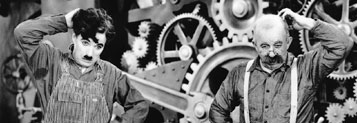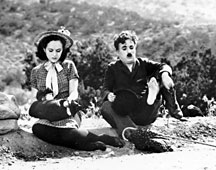Various interpretations

The film's preface says it's "A story of industry, of individual enterprise--humanity crusading in the pursuit of happiness." What exactly does this mean? There are several versions of interpretations. The most acceptable interpretation recently, neutral of course, is that Chaplin hopes the film will remind his audience of their inherent humanity and the need to be treated as a human being and not as a machine or, as the opening of this film, as sheep. I got this message from most reviews of this film in the Internet. This interpretation also marched the original Chaplin's idea of making this film. Chapin has repeated himself more than one time that he was not interested in politics. I think this point of view is trying to dodge the controversial political issues raised from this film.
As Puccio said in his review, "He takes on the Depression, unemployment, riots, strikes, everything he can associate with the problems of the era. It's no wonder many of the democratic countries of Europe denounced it as Communist propaganda and that Communist Russia denounced it a capitalist propaganda."(2)
In another article, Simonian expressed his idea, "In fact, the public ridiculed and blamed Charles Chaplin for bringing matters to the surface that contained tension and fear. For example, Modern Times was successful because it allowed people to make light of the hardships felt during the Great Depression and of the industrial worker lifestyle." (3)
Therefore, we can see the film Modern
Times was described has political meanings. In the capitalism
countries, the film was given communist tone. All the scenes
and story setting was considered to promote communist ideas
and spreading fear. While in communist countries, the film was
given a new meaning; it was the capitalist propaganda and showing
the capitalistic way of life.
Last year in one of my course, this film was presented to the
class to show the process of mass production. The main focus
was the Fordism of modern age and its relationship to the consumer
culture. The purpose of showing this film was simply to show
the way of production of that era. Although this is a very old
film, this was not the first time I've heard about it. My father
once talked about this film with me. Decades ago, there were
virtually no foreign films in China, especially American ones.
Surprisingly, Modern Times was quite popular in China. Everyone
of my father's generation have seen the film before. The purpose
of that was to criticize the capitalism social system. The idea
was industrialization as problems was not inherently bad. Instead,
the ruthless capitalists were causing the social problems because
they maximized personal profit by exploiting workers. Modern
Time was a perfect example to demonstrate this point, especially
the first factory scene. Even today, the clip of this film is
still being showed in some high school politics lessons in China. However,
when my generation watches this film today, we usually think
it's just a classic comedy.
 In
response to the claim of this film had a political tone; Chaplin
denied these allegations and indicated that he was simply an
artist delivering comedy. Chaplin must have been frustrated because
the meanings he attempted to portray became misunderstood. So
many people have biased opinions of his Modern Times in a sense
that they thought it was something else rather than a comedy.
In
response to the claim of this film had a political tone; Chaplin
denied these allegations and indicated that he was simply an
artist delivering comedy. Chaplin must have been frustrated because
the meanings he attempted to portray became misunderstood. So
many people have biased opinions of his Modern Times in a sense
that they thought it was something else rather than a comedy.
In conclusion, while interpret a film it is important to remember
that this information and meaning can organized or explained
in different ways. Therefore, meanings and actions can mislead
the viewer to understand an issue entirely differently than
what the artist, in this case Charles Chaplin, originally intended.
Siliang Xu yu274663@yorku.ca

|
Disclaimer © 2003 - 2004 by class of SOSC 4319 at York University |